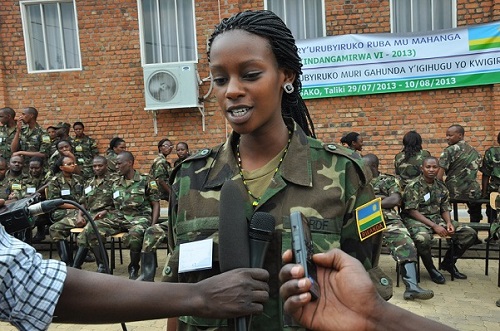 -This summer, from 29th July 2013 to 10th August 2013, young Rwandan students abroad under the government scholarship have been forced to return to Rwanda and spend their summer holidays in a military and intelligence training programme. Around 267 students studying abroad traveled to Rwanda and went to Gako military camp to participate in what Rwandan Government called “Itorero” or “Civic education”.
-This summer, from 29th July 2013 to 10th August 2013, young Rwandan students abroad under the government scholarship have been forced to return to Rwanda and spend their summer holidays in a military and intelligence training programme. Around 267 students studying abroad traveled to Rwanda and went to Gako military camp to participate in what Rwandan Government called “Itorero” or “Civic education”.
Joana Gakwaya, a student in Canada attending “itorero”
The attendees were given training in handling weapons, military tactics, fighting, spying and reporting techniques. Trainees were selected and put into different groups specialising in different areas such as special intelligence assistance, communication operatives and campaign assistants. Other students may have even been sent to conflicts areas in Eastern Democratic Republic of Congo to observe real-life combat within M23 ranks during those three weeks.
In contrast to the military nature of the programme, its official website defines it as “a Rwandan civic education institution which aims mainly at teaching all Rwandese to keep their culture through its different values such as national unity, social solidarity, patriotism, integrity, bravery, tolerance, the dos and don’t’s of the society, etc.”
However, not only attendees were wearing military uniforms but also among the speakers was General Patrick Nyamvumba, Chief of Defence Staff of the Rwandan Defence Forces.
At the end of the programme, trained students are now coming back to their host countries to resume their studies. In addition, they are expected to join existing spy networks targeting Rwandan refugees and members of Rwandan political opposition.
Although this military and security training is compulsory for all students studying overseas, many of them decided to cancel their trip home for holidays in order not to attend the programme. Others, upon arrival home, have had to flee the country. Most of those students who refused to attend saw their scholarship stopped.
Four Rwandan students who refused to go back for fear of forced military training and participation in conflicts area have sorted to seeking asylum in the UK. A few others went into other EU countries for safety.
Earlier this year, the Global Campaign for Rwandans Human Rights (GCRHR), a London-based advocacy group of human rights experts and lawyers promoting the respect of human rights of Rwandans had conducted investigation into the impact of “activities that young people are obliged to attend, including military training, basic spying skills, and developing effective narratives aimed at silencing any critics of the Rwandan government”.
The GCRHR, in its April 2013 report titled “Harassed to harass in the name of dignity, Young People as a Tool to Sustain Oppression”, has expressed its concern that an increasing number of young people, suffering various levels of physical and psychological health issues, were seeking asylum abroad in order to flee from being used as a tool of oppression.
Three other young people who went home for training were interviewed by Rwandan security agents on suspicion of providing information to GCRHR investigation. Their national passport have been withheld.
GCRHR has confirmed that many young people in Rwanda are living in fear of being forced into military enrollment for the M23 rebels and, at the very first opportunity, they leave the country knowing that, if deported, the risk of death is very high for themselves and for their families back home.
GCRHR has reported cases of torture and disappearances of former asylum seekers deported from abroad, once they arrived in the country.
The GCRHR report also revealed that “there have been cases of disappearance of young people after they have participated in the training camps. Most parents and relatives of the disappeared young people are reluctant to report it to the authorities for the fear of being considered as critics or suspicious to the authorities.”
“Young people in diaspora particularly students on Rwandan government or donors scholarships, informed us that they feel pressurised by embassies to participate in those activities. Some students also mentioned that the high frequency of those activities impede their education attainments”
Christophe Sangano
